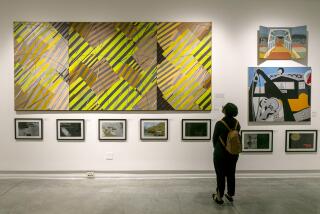FTC Complaint Says Art Dealer Sold Fake Prints : Fraud: Investigation is part of nationwide crackdown. The number of customers who may have bought the alleged counterfeits from the distributor in Orange is unclear.
- Share via
The Federal Trade Commission has charged an Orange art dealer with selling counterfeit prints attributed to such artists as Marc Chagall, Salvador Dali and Pablo Picasso.
A civil complaint filed Tuesday in U.S. District Court in Los Angeles accused Hang-Ups Art Enterprises Inc. of selling fake limited-edition prints carrying forged artists’ signatures. The commission seeks an injunction to prevent further sales of the work and to refund money to customers.
The FTC has been investigating art publishing companies and their retailers in a nationwide crackdown on fraud since 1991, said Monica E. Tait, an FTC attorney in Los Angeles.
“We are alleging that they sold art that was not the actual work of the artist,” Tait said. “Either the signature was false or they were not individually hand-signed. . . . We estimate that nationwide, thousands of these allegedly fake prints may have been sold.”
Hang-Ups Art is a fine arts distributor on Katella Avenue that sells work primarily through charitable and public auctions. The FTC targeted the company after investigators found it may have had links to a 1991 art scandal involving the New York publishing company Leon Amiel Publisher Inc., according to court documents filed by the FTC.
That publisher eventually was convicted of creating and distributing fake artwork, and the FTC obtained court orders to investigate galleries and retailers in order to discover the extent of the counterfeit operation, Tait said.
The FTC’s lawsuit against Hang-Ups Art is the first in California to result from the Amiel investigation, Tait said.
According to court documents, FTC investigators had evidence “indicating that Hang-Ups had purchased hundreds of suspect art prints from wholesalers known to have dealt in counterfeit artworks.”
Only one of the company’s three owners, vice president Max Klein, was named in the FTC suit.
An attorney for Hang-Ups Art said the owners of the 10-year-old company are also victims in the case.
“My clients, being from Orange County, were not sophisticated,” said David Paul Steiner, a Los Angeles attorney who specializes in art law. “Later on, they and others found out that these suppliers were crooks.”
The wholesalers and suppliers who sold Hang-Ups Art prints were highly respected in the field until the Amiel scandal, he said.
Steiner said the company stopped selling prints that might have been associated with the Amiel case as soon as the scandal broke. But the company is not conceding that it actually sold counterfeit work, Steiner said. “It is not clear to us that any of this artwork is fake,” he added.
“What this really boils down to is the FTC trying to rely on certain experts’ very narrow definitions about what an original print is, what an authorized work is and whether the name of the artist can be attributed to the artist or not,” he said.
The FTC has refused to disclose how many customers may have bought the allegedly counterfeit art. Tait said investigators learned the names of some of the customers through the search of documents but that they have probably not found everyone.
“My personal suspicion is that most consumers do not know about” the alleged fakes, Tait said. “We anticipate that we are going to locate such people.”
More to Read
The biggest entertainment stories
Get our big stories about Hollywood, film, television, music, arts, culture and more right in your inbox as soon as they publish.
You may occasionally receive promotional content from the Los Angeles Times.










